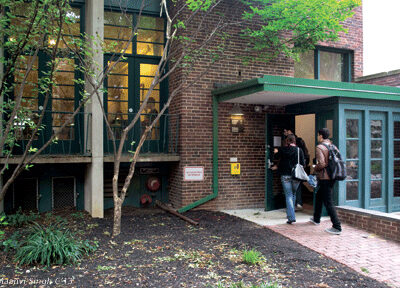
Basic training and graduate school don’t have much in common and few Doctors of Philosophy have been to Fort Dix. But careful scheduling and strict attention to routine can help with the hand-to-hand combat of completing a Ph.D. dissertation. That was the idea behind the Dissertation Boot Camp, which took place at the Graduate Student Center, in a quiet house on Locust Walk.
Twenty graduate students, three-quarters of them women, enlisted for the two-week summer session. It was a lively group, especially considering that they came from different departments and most of them had never met before they gathered at 9 a.m. after Philadelphia’s big Fourth of July weekend.
During an introductory workshop, Pat Thatcher, associate director of Penn’s Learning Resources Center, flashed a series of canards on the screen: “The only good dissertation is a finished dissertation” and “You’re not writing a book, just another final paper.”
“How do they make you feel?” she asked.
“Pissed off,” said one student, and she wasn’t alone. All had struggled with their own writing and research, and they were looking for concrete advice on how to make the process go more smoothly. As one writer pointed out, even the desk where one works is unsafe, since the Internet makes it possible to waste hours of time. Thatcher confessed that she once tied herself into her chair to get her dissertation completed. It took a few repetitions before she could be believed, but then other confessions came out: “I don’t take a shower and change out of my pajamas—my neighbors think I am hibernating.”
Though they shared a common purpose, the specific goals of the recruits were as varied as their disciplines. “Before the camp I was working diligently,” said Meghan McInnis, a doctoral candidate in Romance languages, “but I felt like I had become an expert in wasting time because I never seemed to accomplish as much as I had hoped.” She wanted to finish the first draft of the third chapter of her dissertation, examining how travel writers from 1492 to 1619 “treat the Spanish Empire as a diseased state through their allusions to contemporary Spanish medicine.”
The English department’s Stephanie Harzewski was used to working at home on her dissertation, entitled, “The New Novel of Manners: Chick Lit and the Evolution of Romance Narrative.” “Frankly, I didn’t know if I could hack it [at the boot camp], or if the commute to campus … would be worth the effort,” she said. Time was of the essence for Heidi Kuehne, a biologist studying the metabolism of yeasts. She had a post-doc lined up in Montana, so her goal was to have a “solid document” by the end of the summer.
With these goals in mind, the writers reported for duty from 9 a.m. to 1 p.m. each day to the third floor of the Graduate Student Center, a series of well-lit rooms filled with desks that run on castor wheels over new carpeting, and overstuffed chairs and couches.
Meredith Wooten, the camp’s organizer, studies political science and presidential war rhetoric, which explained the authentic feel of the boot camp signage—faux recruiting and propaganda posters, such as, “When You Procrastinate, Others Are Watching,” and “Together We Can Do It.” In her drill sergeant role, Wooten said the door would be locked to restrict access to the building, and the person downstairs had a list of those who could enter. Rules were negotiated about music, eating, and cell phones.
In order to help the writers to take the camp seriously, they were required to pay a fee of $50, which was refunded at the end of the two weeks. Some students recorded their progress on written schedule grids, and others signed formal contracts with themselves to complete a given chapter in a set period of time. This formality can conflict with the way that many people work, however. Thatcher, of the Learning Resources Center, talked about the difference between linear and non-linear organizational styles.
Students also were urged to develop an “addiction” to writing, and to work on it regularly. “The intense focus on the dissertation ultimately worked,” Harzewski said. McInnis agreed, calling the boot camp “a very fruitful experience.” After two weeks of the boot camp’s structure, McInnis said, “Now I realize that writing has to come first, even before household duties, exercise, and other work.”
With that lesson fresh in their minds, these students marched a step closer towards the completion of their “final papers.”
—John H. Walker Gr’99




